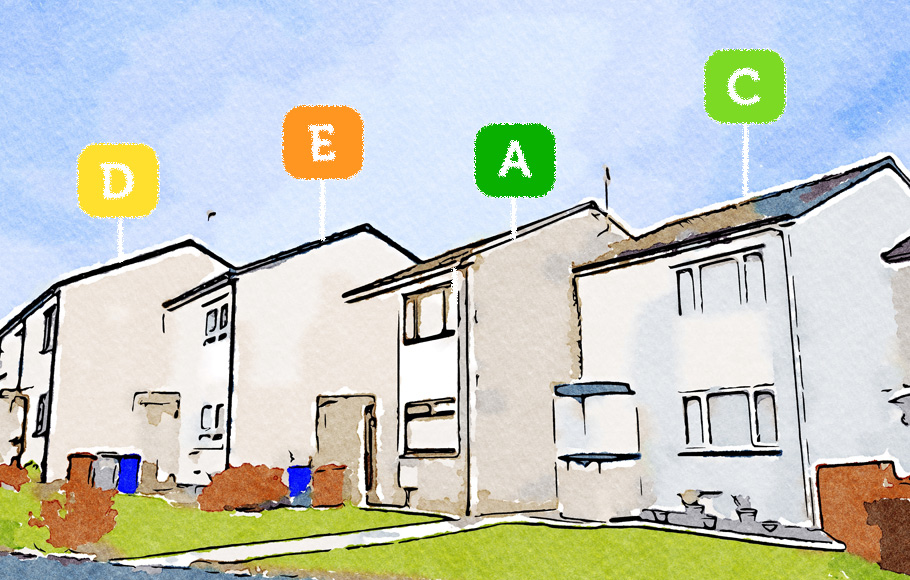Government Proposes Minimum Energy Efficiency Standards for Social Housing in England
The government has released a proposal to introduce a minimum energy efficiency standard (MEES) for socially rented homes in England, as part of an effort to make these properties easier to heat, tackle fuel poverty, and reduce carbon emissions.
Socially rented homes are not currently required to meet a minimum EPC standard, and according to the government, current requirements are roughly equivalent to an EPC ‘F’ rating. The government’s preferred outcome of this consultation is to set a new standard for social landlords to get to EPC C or equivalent by 1st April 2030. This aligns with what has already been proposed within the domestic private rented sector.

What is Being Proposed
Use of new EPC Metrics
Wider reforms to EPCs have already been consulted on, with new primary metrics proposed and responses under review by government. The proposed introduction of Fabric Performance, Heating System, Smart Readiness and Energy Cost as primary metrics signals a move away from the single Energy Efficiency Rating (EER) currently displayed on EPCs as an A to G Rating.
With regards to MEES for the social rented homes, the government proposes using one or a combination of the first three metrics (fabric, heating system, and smart readiness), rather than relying on a cost-based metric. The preferred option is for homes to meet a standard for fabric performance (the thermal performance of a building’s envelope) and a second standard for either heating system or smart readiness by 2030.
Once again, this aligns with what has been proposed for reforms to Domestic MEES in the private rented sector.
“Focusing on fabric measures will improve the thermal comfort and overall decency of homes, reducing energy bills for tenants and reducing incidences of damp and mould. In practice, this means that providers would be required to prioritise investment in measures such as loft insulation, to achieve a fabric standard of EPC C.”
Part of the Decent Homes Standard (DHS)
The proposed MEES would form part of a reformed Decent Homes Standard (DHS), which is also open for consultation and expected to be introduced in either 2035 or 2037. It is intended that the new energy efficiency requirement would align with Criterion D – Thermal Comfort of the updated DHS.
If adopted, regulation would fall under the Regulator of Social Housing (RSH) , rather than local authorities, which are responsible for enforcement of MEES in the private rented sector.
Exemptions
The government is considering a range of targeted exemptions, some of which are already part of the existing DHS and may be retained or adapted.
These include situations where tenants refuse access for improvement works (with strengthened guidance on landlord responsibilities), cases where physical or planning constraints such as those affecting listed buildings-make upgrades impractical, and properties that are due to be sold, demolished or regenerated. In each case, providers would be expected to demonstrate that they have taken all reasonable steps before relying on an exemption.
In addition, a new time-limited spend exemption is being proposed specifically for MEES. This would allow landlords to classify a property as compliant if they have spent up to a proposed limit of £10,000 per property on qualifying energy efficiency improvements, even if the property still falls short of the standard. All relevant spending, including grant-funded work, would count towards the exemption, and costs incurred from the date of the government’s formal response to the consultation would be eligible.
The exemption would last for ten years from the MEES compliance deadline of 1st April 2030, after which landlords would be expected to complete any outstanding work to bring the property up to standard. The government believes this approach supports the core aims of reducing fuel poverty and carbon emissions, while allowing social landlords to manage competing demands on resources, such as delivering new housing and maintaining existing stock.
Elmhurst’s Thoughts
Elmhurst’s Managing Director, Stuart Fairlie, has welcomed the alignment between proposals for the social rented sector (SRS) and the private rented sector (PRS), praising the government’s effort to create a more consistent and strategic approach to improving housing energy performance across tenures:
“We are pleased to see joined-up thinking and strong alignment between what’s being proposed for social housing and what we have seen proposed for the private rented sector. A consistent framework for assessing and improving energy efficiency, especially through the proposed adoption of new EPC metrics, is a smart and strategic move that gives clarity to housing providers, assessors and the wider industry.
While there are currently no minimum energy efficiency requirements in the social rented sector, many providers have already made significant progress, with a large proportion of homes now achieving EPC band C or above. Establishing MEES for social landlords will help to build on that momentum, providing the certainty needed for long-term investment in both existing homes and new developments.
As ever Elmhurst will be developing its own response to this consultation with valued input from Members.”
The consultation for Improving the Energy Efficiency of Socially Rented Homes in England, is open until
Related Links
